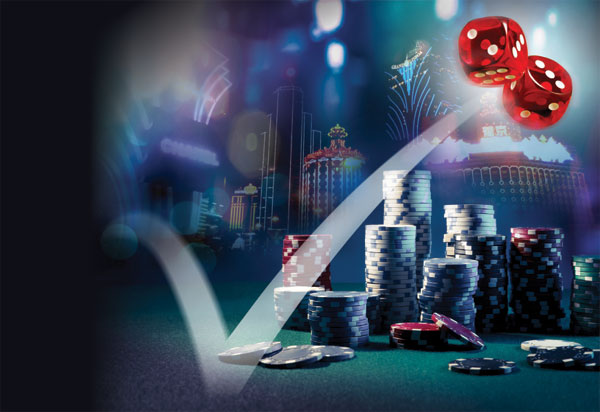Time to roll the dice
Updated: 2015-02-27 16:38
(China Daily USA)
|
|||||||||
One can hardly imagine that the tiny city of Macao, already chockablock with 35 casinos, could bear to fit in even more. And yet that is exactly what the gaming magnates have in mind.
Macao's Cotai area, a 5.2-square-kilometer piece of reclaimed land, is effectively a massive construction site. Countless cranes swing overhead, building dozens of gaming resorts along its high street, Cotai Strip - some already glittering with glass curtains in place, others still covered in dusty scaffolding. A line of concrete pillars rise to the sky, pointing to the light rail service scheduled for 2016.
In January, Lawrence Ho Yau-lung, CEO of Melco Crown Entertainment and son of legendary casino tycoon Stanley Ho Hung-sun, unveiled details of his newly developed Studio City, a $3.2-billion gambling complex.
Switching focus from high rollers to mass-market gamblers, Melco plans to open a family entertainment center featuring Time Warner icons and a Batman virtual reality ride. To showcase its extravagant project, the company even sponsored a short movie, directed by Oscar-winner Martin Scorsese and starring Hollywood superstars Leonardo DiCaprio, Robert De Niro and Brad Pitt.
That came as Lui Che-woo, the gaming baron who controls Galaxy Entertainment Group, said the casino operator is poised to open phase two of Galaxy Macau, doubling the size of the resort, on May 27.
Also unveiled the same day will be the renovated former Grand Waldo Complex, renamed Broadway at Galaxy Macau. Capital expenditure for the two projects amounts to HK$43 billion.
"What we'll do is make it more diverse, from entertainment, leisure, culture and art, we will continue to expand," Lui said at a press conference in Hong Kong on Jan 22.
But behind the hustle and bustle, the Macao gaming industry is enduring a chilly winter. Gaming business has been in contraction, after expanding rapidly for at least more than four straight years.
Monthly gross gaming revenue (GGR) has been falling since last June, with December GGR decline deepening to 30.4 percent compared with a year ago. As a result, 2014 recorded 2.6 percent on-year decline in accumulated gaming revenue, data from the Gaming Inspection and Coordination Bureau of Macao (DICJ) show.
Stocks of casino operators have also tumbled. SJM Holdings Ltd plunged almost 54 percent from last spring's high of HK$25.55 to HK$11.86 on Jan 29, while Galaxy Entertainment dived 46 percent from HK$78.25 on last Feb 27 to HK$42.10 apiece on Jan 29. BI Macau Gaming Index, a barometer of the sector published by Bloomberg Intelligence (BI), fell from the one-year high of 772.78 last March to a low of 387 on Jan 21.
The decelerating economy on the Chinese mainland is not favorable for the gaming industry and the political atmosphere, amid a crackdown on corruption, is also having a choke effect, especially for high rollers, said a Barclays report published in January.
Mainland gross domestic product (GDP) grew only 7.4 percent in 2014, and the World Bank estimates GDP growth this year to further slide to 7.1 percent. Given the historical correlation between Macao GGR and key mainland macro indicators, the continued weakness in the mainland macro economy will lead to less chance of strong recovery in player sentiment, the bank said.
Playing by the rules
The anti-corruption campaign, targeting extravagant lifestyles of bureaucrats, has been in place for more than 18 months, since being announced in mid-2013. The environment could continue to cause certain VIP players, and some premium mass-market players, to be more cautious about going to Macao, the bank pointed out.
"We believe these sensitive players might only come back if the anti-corruption drive eases. For now, however, there is no clear sign when the campaign will wind down."
Separately, the mass market has also been hit by the changing of rules. Last July, a new restriction cut the maximum stay for mainland visitors on a transit visa from a week to five days. And for those not going to really transit to another destination, only a single day of stay would be granted upon a second entry within two months, and entry denied outright the third time.
The rules affect frequent visitors who are average players, and the number of arrivals excluding group tour visitors is declining.
What's more, a smoking ban on mass-market floors was implemented on Oct 6. Following that, mass-table revenues turned to negative growth in October for the first time in five years and declined for three months in a row. "The smoking ban negatively impacts players' length of play and size of bet," the Barclays report said.
However, the pain will likely not ease in the short term. At the end of December, as the former Portuguese colony celebrated its 15th anniversary of handover, President Xi Jinping called on the government of the SAR to show "greater courage and wisdom" to "strengthen and improve regulation and supervision of the gaming industry". In response, Macao Chief Executive Fernando Chui Sai-on promised that his new administration, which took office only in December, would bring forward the interim review of the gaming sector from the second half this year to the spring.
The policy uncertainty would lead to volatility in the equity market, warned Billy Ng, head of Asia gaming at Bank of America Merrill Lynch Global Research. He estimates that the review will likely target high rollers and introduce additional anti-money laundering rules, as "regulation could always be tighter" to intercept capital flight from the mainland.
Meanwhile, chances that the smoking ban would be extended to VIP tables as well are "pretty high" this year, and this would cast a "negative impact" on revenue performance and see the "GGR tumble further, especially in the first quarter", Ng said.
However, he added that such actions on VIP business will likely do less harm to casino operators, given the segment now only accounts for around 30 percent of their earnings.
Given a high comparative base and the perceived wait for the other shoe to drop, Merrill Lynch estimates annual GGR will fall 10 percent in 2015, with the first half expected to post a 24.7 percent decline and the second half a 4.2 percent recovery.
"We hope the government could announce the bad news in the first half - if they are to adopt new rules anyway. Share prices can only recover when the bad news is priced in," Ng said.
The tables may look less than inviting at the current stage, but the future is always worth betting on. It is expected by some players that new supplies will reignite the gaming floors of Macao.
"Resurgence in Macao's casino revenue growth may occur with the opening, in rapid succession, of eight mega projects, starting in the middle of 2015," said Tim Craighead, senior gaming analyst at BI, in a recent report.
"The long-held thesis that Macao casino industry growth is constrained by the supply of hotel rooms will again be put to the test."
Three new resorts - Phase 2 of Galaxy Macau, Studio City of Melco and Sands China's The Parisian - will open this year. The expansion will end Macao's longest pause in building resorts since 2012 and trigger a 40 percent increase in hotel room supply. Three more have been scheduled for next year and 2017.
The last three resorts that opened on the Cotai Strip sparked a surge in revenue for their operators. Sands China's revenue averaged 38 percent on-year growth during the six quarters after Cotai Central opened in 2012, while Galaxy's revenue jumped 94 percent during 2010 and Melco Crown posted a surge of 105 percent in 2011. "These illustrate how Macao is a supply-driven market," the BI report pointed out.
Taking a gamble
But the bears still have a case, given the new resorts would boost demand in the labor market, adding an estimated 50,000 jobs, whereas Macao's unemployment rate is already just 1.7 percent. Rising labor costs must put a considerable squeeze on margins, Craighead said.
"Gambling tables are financial engines to us, without which we wouldn't be able to build and operate non-gaming attractions," said Lawrence Ho at the January press conference.
Ho said he had no idea how many tables Studio City is going to be granted, though the resort has been built with a capacity of 500 tables. "It's in the hands of the authorities," he said.
"However, we are confident because the government said allocation of new tables depends on contribution to the diversification of Macao. And 95 percent of our properties are non-gaming. We even invested in a short movie to promote the city," Ho pointed out.
Contact the writer at emmadai@chinadailyhk.com
|
After a gloomy 2014, Macao gaming revenue has yet to hit the jackpot but analysts believe fortunes will turn. Emma Dai reports. |
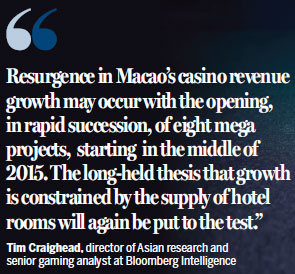
(China Daily USA 02/27/2015 page7)
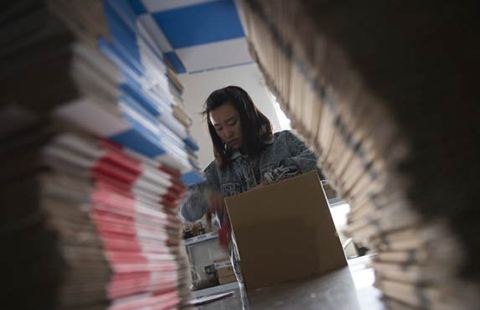
 Inside a Taobao village
Inside a Taobao village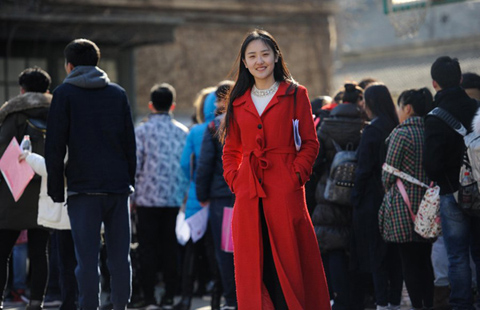
 Testing mettle: Students appear for art college exam
Testing mettle: Students appear for art college exam
 Top 10 best-selling SUVs in Chinese mainland in 2014
Top 10 best-selling SUVs in Chinese mainland in 2014
 The eighth nine days: wild geese are flying back
The eighth nine days: wild geese are flying back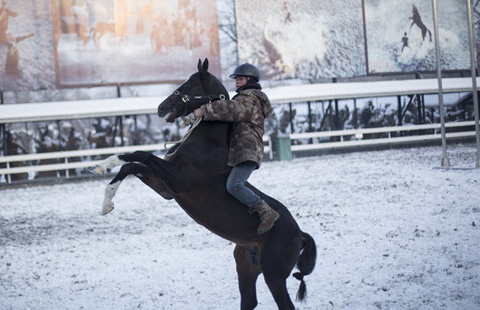
 China's biggest Akhal-Teke horse base
China's biggest Akhal-Teke horse base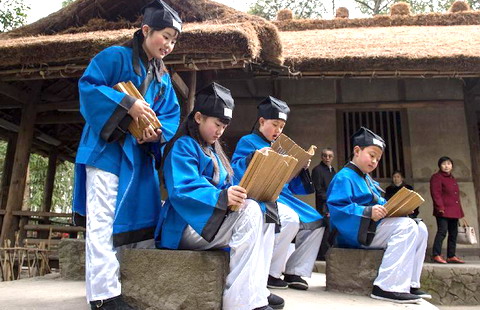
 Chengdu citizens visit Du Fu Thatched Cottage to mark Human Day
Chengdu citizens visit Du Fu Thatched Cottage to mark Human Day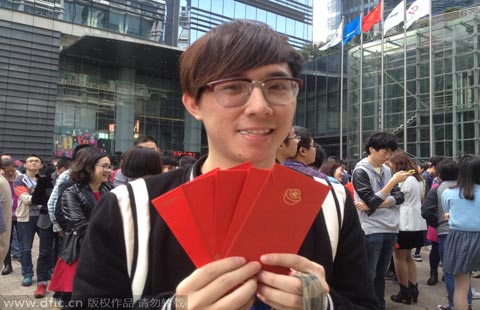
 Tencent gifts red envelopes to employees
Tencent gifts red envelopes to employees Throwing coins to please God of Wealth
Throwing coins to please God of Wealth
Most Viewed
Editor's Picks

|

|

|

|

|

|
Today's Top News
China, US work to make Xi's visit successful
Lawyers question jury-selection for Boston bomber's case
Challenges loom as meetings approach
Chinese smartphone company seeks more gains in US
Obama blames immigration woes on Republicans
New fighter jet ready for PLA
Why China's youth is getting the needle
Most Chinese forced to return home were living abroad illegally
US Weekly

|

|
